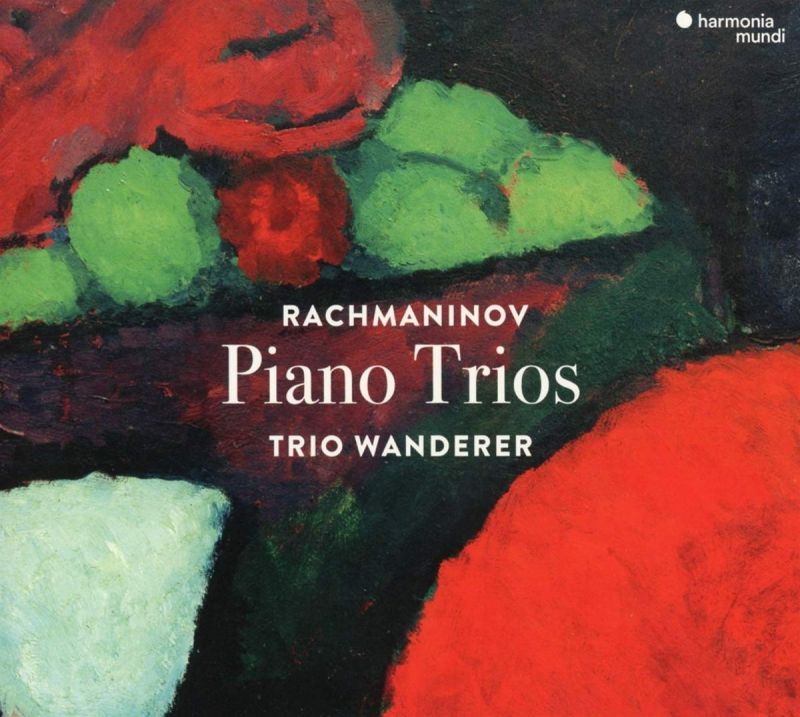RACHMANINOV Piano Trios (Trio Wanderer)
View record and artist detailsRecord and Artist Details
Composer or Director: Sergey Rachmaninov, Josef Suk, Edvard Grieg
Genre:
Chamber
Label: Harmonia Mundi
Magazine Review Date: 08/2019
Media Format: CD or Download
Media Runtime: 72
Mastering:
DDD
Catalogue Number: HMM90 2338

Tracks:
| Composition | Artist Credit |
|---|---|
| Trio élégiaque |
Sergey Rachmaninov, Composer
Sergey Rachmaninov, Composer Trio Wanderer |
| Andante con moto |
Edvard Grieg, Composer
Edvard Grieg, Composer Trio Wanderer |
| Elegie |
Josef Suk, Composer
Josef Suk, Composer Trio Wanderer |
Author: Harriet Smith
Similar reservations occur in the Second, written in memory of Tchaikovsky, though as chamber playing per se there is much to applaud. The opening moments have an apt tolling quality to them but there’s an altogether darker, more gnawing quality to the playing of Kozhukhin, Renaud Capuçon and Levionnois from Lugano, while the grief becomes even more palpable in the hands of Berezovsky, Makhtin and Kniazev. Similarly, the Wanderer build to climaxes that are exciting but not as emotionally shattering as some (sample track 2, 2'20"). But the moments of beauty – such as the duet between strings against trickling piano-writing (from 4'56") – are very finely wrought.
In the second movement (Quasi variazioni) Vincent Coq finds far more naturalness to his piano soliloquy than the ultra-haloed Trifonov on the Kremer set. The entry of the strings, against gossamer piano-writing, reminded me more of Ravel than Rachmaninov, as did the Allegro scherzando section. But the muted L’istesso tempo section, with the cello poetic yet restrained, is beautifully phrased. In the Allegro vivace that then breaks out, they observe the piano marking more truly than Berezovsky and friends, though it is the latter that steal the show with their evocation of pealing bell sounds. Others, too, find more mystery in the hushed opening of the Andante section; but again the sheer finesse of the playing of the Wanderer is impressive, as is their quiet chorale-like close. In the finale they find plenty of verve without exaggeration but at times I wanted the drama to be more overtly played out – their ending is less hard-won than some, not least Berezovsky et al.
Grieg’s Andante con moto of 1878 is all that remains of a purported trio project. While the music is hardly top-drawer, again I found the characterisation a little tepid: Raphael Wallfisch, Arnon Erez and Hagai Shaham make a stronger case for it, really letting rip in the pesante chordal writing at 4'48".
The Wanderer end with another in memoriam: Suk’s Elegie, written after the death of his friend, the writer Julius Zeyer, and originally intended for the unwieldy line-up of string ensemble, harmonium and piano. It’s a highlight of the disc, very tender for the most part, but with a real passion in the stormier writing, and they certainly give the very fine Florestan a run for their money.
Discover the world's largest classical music catalogue with Presto Music.

Gramophone Digital Club
- Digital Edition
- Digital Archive
- Reviews Database
- Full website access
From £8.75 / month
Subscribe
Gramophone Full Club
- Print Edition
- Digital Edition
- Digital Archive
- Reviews Database
- Full website access
From £11.00 / month
Subscribe
If you are a library, university or other organisation that would be interested in an institutional subscription to Gramophone please click here for further information.




